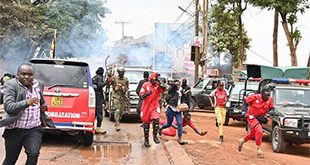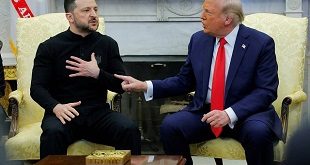Why Uganda needs to reintroduce a broad-based government but this time handle it differently
It is impossible for anyone to convince Dr. Kizza Besigye and his supporters that he lost the just concluded elections. It is equally impossible to convince President Yoweri Museveni and his supporters that they did not win the elections. Besigye and his supporters see Museveni as an ageing dictator determined to cling to power at all costs. So they are determined to bring him down at all costs. Museveni and his supporters see Besigye as a power-hungry demagogue and sour loser seeking to destabilise the country by precipitating an urban insurrection. They are determined to crush him.
The lesson from this is simple but fundamental: truth is not an objective reality but a subjective faith. Truth is not singular but plural. Truth is socially constructed. States used to monopolise the manufacture of truth through control of mass media. Today, social media has empowered impassioned groups to competitively manufacture their own truth.
Museveni is trying to enforce his truth using the state’s instruments of coercion and repression. Besigye is seeking to enforce his truths using discontented urban youths. It is very unlikely that urban insurrection can succeed in Uganda as it did in Egypt, Tunisia and Burkina Faso in 2011/2013. To believe it is to fail to understand the organic character of the government that rules Uganda.
However, even though Museveni will most likely nip any incipient uprising in the bud, he cannot wish away the massive discontent of Besigye supporters. Over the next five years, he is likely to be forced to govern by increasing repression on the one hand and/or making political compromises that will be costly to Uganda.
For example, afraid to lose any powerful figure of influence from the different ethnic and religious communities, Museveni will find it hard to fight corruption or enforce performance. So we are likely to see increased impunity and incompetence. He may also try to co-opt some opposition leaders with money, ministerial, and other appointments. But this will not stem the anger on the street. It will only alienate such opposition figures from their popular base.
Secondly, the government will most likely win street battles against Besigye’s insurrectionists. But it will not win the war for a stable Uganda. The Besigye side will not bring the Museveni government down but it will inflict its toll on it. There will be no winners. Uganda will be the loser in any attempt to enforce any claim by either side that there is one truth about the just concluded elections. And it will be costly to the country.
The solution is to return to the core innovation of the early NRM i.e. abandon winner-take-all politics and return to the idea of a broad-based government. The first experiment failed because of the lack of sincerity on the part of the NRM. While NRM publically denounced partisan politics, all its actions sought to to grow the party’s base and actively weaken the other political parties by coopting their members in cabinet to cross to it. This undermined the spirit of the broad base and turned it into a bread-base.
It is interesting that in Rwanda, the RPF either borrowed this insight from the NRM or was forced upon it initially by the Arusha Peace Accords. Whatever the origins, RPF approached it with sincerity by actively seeking to make partners in the broad-based government retain their identity. Thus, I have never heard a case of any member of other political parties crossing to RPF. On the contrary there is a case of an RPF member who crossed over to the PSD.
This innovation was later written into the Rwanda constitution of 2003. Regardless of the numerical strength a winning party can command from an election, it cannot take more than 50% of cabinet positions. Secondly, once a president comes from one political party, the speaker of parliament automatically comes from another party. President Paul Kagame has gone beyond the requirements of the constitution so that today, the president, the speaker of parliament, the president of the senate (second inline of succession) and the prime minister all come from different political parties.
So after elections there are no losers in Rwanda. All are winners. Secondly, sincerity matters. For example, the RPF has never used its numerical strength or its control of the state to emasculate other parties. On the contrary, it actually does its best to strengthen them; recognising that solving the deep-seated problems of Rwanda requires a collective effort that is supra partisan and trans-group.
What post genocide Rwanda teaches us is that the idea of a broad-based government (or movement system) should not have been seen as antithetical to multiparty politics as Uganda came to see it. Rather it is added value to it. In fact, the idea of the movement system should have been seen as an attempt to avoid the politics of winner-take-all that we inherited from colonial rule and which have inflicted grievous harm to many nations of Africa.
The biggest source of problems in Africa is not the length of period a president serves. I am now inclined to believe it is attempts by one group to monopolise power. I hope this election teaches us that the idea of a broad-based government was great if only it was approached with sincerity and did not seek to supplant multi-party politics but to complement it. Without a constitutional broad-based government, it will be hard to carry out electoral reforms that will minimise accusations of electoral malpractice and all the quarrels and recriminations that go with them.
Ugandan (and African) political elites need to recognise that many of the problems we face – slow growth, low productivity, poor public service delivery, weak position in international trade, lack of policy independence, etc. – have deep structural roots. This means that such issues should stand above partisan politicking. Resolving them will take a very long time that no president, however long he serves, can overcome them.
In pre-genocide Rwanda, winner-take-all politics drove politicians anxious to retain power to the extreme of genocide and national destruction. Broad-based politics has made Rwanda one of the most peaceful and progressive governments in this world. You don’t hear of demonstrations in Rwanda. Some people think this is due to repression. That is nonsense. No amount of repression, however technologically advanced, can suppress people’s feelings as the experience of Israel and Apartheid South Africa demonstrates. This is where our national conversation ought to begin .
amwenda@independent.co.ug
 The Independent Uganda: You get the Truth we Pay the Price
The Independent Uganda: You get the Truth we Pay the Price



